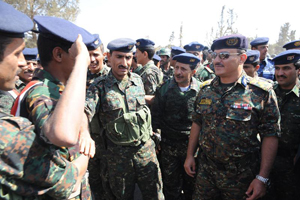
Brigadier General Yehia Mohamed Abdullah Saleh, one of President’s Saleh nephews and head of the Central Security Forces recently told Reuters in an interview that although he was willing to engage into talks to get Yemen out of the current political stand-off, he was also ready to “break the necks” of whoever would try to oust Saleh by force.
He told the news agency that he did not believe that Yemen would have to live through another bout of violence, such as was witnessed in May.
“There is no solution other than dialogue to put an end to this crisis.”
“Some forces are pushing for confrontations. I reassure the Yemenis that this will not happen. The concerns about a civil war in Yemen are false, God willing. But if they resort to arms or force, they know we will break their necks. And we will break the neck of anyone who tries to damage or harm the security and stability of the nation,” he said.
It is this very rhetoric that has thrown Yemen into the mess that it is in right now. From the very beginning the regime has associated pro-democracy protesters with war mongers, whose aim was to destabilize Saleh’s rule, rather than admit that Yemenis across the board were deeply dissatisfied with the president’s policies. And if the tribes are indeed fighting off the government forces in Arhab and Taiz it is because they are trying to protect the protesters from being massacred.
One has to remember that it is only following the attack on Liberty Square in Taiz, which led to the deaths of some 200 civilians, that the nearby tribes decided to step in and act as a shield for the protesters. As for the revolutionaries, they are still calling for a peaceful end to the regime. Only yesterday, tens of thousands of men and women marched through Sana’a demanding the departure of the regime and expressing their desire for a non-violent transfer of power. In Taiz and across other cities and villages in Yemen, similar gatherings took place.
Politics and Diplomacy
Over the past few days, several rumors have been circulating about whether President Saleh has caved to the pressure exerted by the Americans and the Saudis, and if he has agreed to remain permanently in the KSA. Diplomatic sources allegedly told a Saudi paper the US warned Saleh that his return would ignite a civil war. And although the Yemeni government strongly denied the news, calling it ludicrous, President Saleh is still very much in Saudi Arabia, despite having been discharged from the hospital. Officials are explaining Saleh’s decision to prolong his stay by saying he is following his doctors advice, not because the Americans have bullied him.
The embattled 69 year-old autocrat is now believed to be studying yet another GCC proposal which would announce the terms of the transition of power. However, one is allowed to remain skeptical as Saleh has backed out of such a proposal on three separate occasions. Furthermore, it was only a week ago that he announced he would not leave the presidency before the end of his term. This new plan was brokered by the Gulf Cooperation Council under the leadership of the Kingdom of Saudi Arabia. Very much like the Americans, the Saudis fear that a prolonged instability in Yemen could eventually spread out to the region, endangering the oil trade and the global economy. The fact that alleged al-Qaeda fighters have now taken control over the southern province of Abyan is only making the situation more dire for the two countries. This fear was echoed by the UN Security Council on Tuesday when it cited the humanitarian crisis in Abyan, where Islamists fighters have seized territories.
General Brigadier, Yehia Saleh admitted to Reuters that a transition of power was possible. “He is president until 2013. However, if there is a political solution, this is a different situation.” But again, it was the same Yehia Saleh who swore to “wipe out” the protesters, calling them “dogs” and “illiterates” in an interview with the Yemeni state TV. He also denied any wrong doings when questioned about the methods used against the protesters, accusing the opposition of lying to the press. He justified the air raids on Arhab and Naham by claiming that al-Qaeda fighters were operating in those villages, supported by defected General Ali Mohsen al-Ahmar. “Those who are fighting in Arhab are not from Arhab, they are from al Qaeda and the First Armored Brigade.
If anything is to be understood from the president’s nephew’s remarks it is that Saleh’s clan is not yet ready to take its final bow. Quite clearly the regime is using the so called “negotiations” with its allies to gain some time and turn the situation in its favor. Saleh is a shrewd politician who for over 33 years has managed to shake off the opposition, asserting his rule and that of his family over the land. It would be foolish to think that anything less than an act of God would dislodge him from his “throne”.